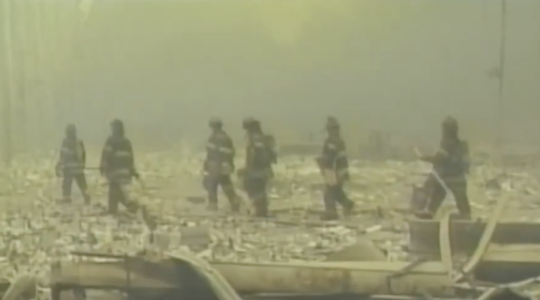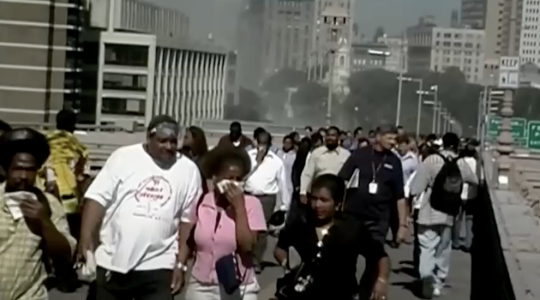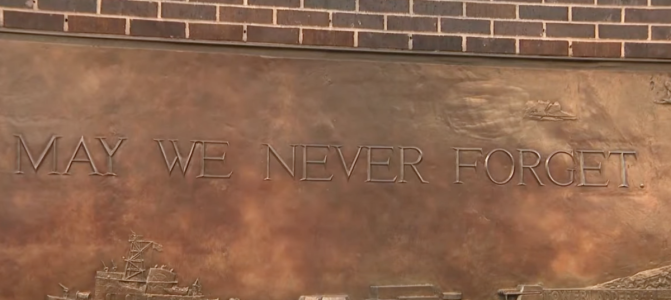Are you at risk? How federal staffing cuts could leave some Americans without crucial health assistance
- Replies 0
Over two decades have passed since the tragic events of September 11, 2001, yet the aftermath continues to unfold in the lives of thousands who were exposed to the hazardous aftermath.
The World Trade Center Health Program, a beacon of hope for many, now faces an uncertain future due to recent federal staffing cuts.
The GrayVine community understands the importance of accessible healthcare, especially for those who have served or suffered in the wake of national tragedies. The potential disruption of this vital program is a matter of life and death for many aging Americans.
The Growing Need for the World Trade Center Health Program
More than 23 years after the collapse of the Twin Towers, which covered lower Manhattan in toxic dust and debris, the number of people diagnosed with 9/11-related illnesses continues to rise.
Since 2011, the World Trade Center Health Program has served as the primary resource for those exposed to the fumes, offering treatment for conditions such as cancer, asthma, and post-traumatic stress disorder, among others.
As of December, around 132,000 people were enrolled in the program, with 64% of them having at least one health condition linked to 9/11.
Cancer is the most prevalent, affecting over 40,000 members. Some individuals join the program after their illnesses have developed, while others enroll for annual screenings to detect potential future health issues.

The Impact of Staffing Cuts
The program’s future has fluctuated over the past 10 weeks as the Trump administration made staffing changes, firing and rehiring certain employees, only to terminate them again last month, according to lawyers and advocates representing people exposed to 9/11-related toxins.
These staffing cuts have made it more difficult to enroll new members or confirm that their treatments are covered by federal funding.
“These cuts are going to potentially delay treatment, delay diagnosis and early detection of their cancers, and it’s going to cost lives,” said Todd Cleckley, a nurse medical specialist at Barasch & McGarry, a law firm representing 9/11 responders and survivors.
“The health program already operated on a very slim staffing margin,” he added. “We’re only beginning to see what those negative impacts will be.”
Sixteen staff members from the program were affected by the Trump administration’s February decision to fire probationary workers. The positions were reinstated about a week later, following criticism from both Republicans and Democrats in Congress.
However, in late March, the Department of Health and Human Services (HHS) announced plans to lay off approximately 20,000 federal employees, which again included 16 staffers from the World Trade Center Health Program, as well as the program’s director, according to lawyers and advocates.
The director was reinstated on April 5 after bipartisan opposition, but the staff members were not.
These layoffs were part of a larger restructuring within HHS that significantly impacted the agency overseeing the World Trade Center program, the National Institute for Occupational Safety and Health (NIOSH).

In addition to the 16 staffers, other employees responsible for certifying that patients’ 9/11-related illnesses were eligible for federal funding were also let go, according to advocates and lawyers.
“They weren’t on the World Trade Center Program payroll, but they did things that are essential to the program running,” explained Benjamin Chevat, executive director of 9/11 Health Watch, a nonprofit organization ensuring access to the program’s services.
Lawyers and advocates are planning to visit Capitol Hill on Tuesday to urge lawmakers to reinstate the staffers. HHS did not respond to requests for comment.
New York City Mayor Eric Adams stated that his office has contacted the federal government “about restoring these important resources.”
In earlier news: Elon Musk’s DOGE decision could put $1 billion in affordable housing at risk—are you affected?
“New York City is dedicated to providing quality health care to the heroes who responded on 9/11 and the survivors of the most tragic day in America’s history,” Adams said in a statement. “Our partnership with the federal government to deliver these services is vital, providing access to life-saving, time-sensitive treatment for every firefighter, police officer, volunteer, and everyday New Yorkers who remember that day, and remember what it took to rebuild the next morning.”
The Dire Consequences of Delays
Before the staffing cuts, 9/11 responders and individuals who lived, worked, or attended school or daycare in the affected area could apply to join the program and typically receive acceptance within a few weeks.
However, Chevat noted that no one has been enrolled since April 1. The program typically enrolls about 200 people per month, on average.
Michael Barasch, a partner at Barasch & McGarry, stated that he continues to submit applications on behalf of his clients, but “they’re not hearing from the health program, so we don’t know if or when they will ever get an appointment.”

Members of the program receive annual screenings at certified health clinics, which are mainly located in the New York area.
There, doctors assess patients for a range of mental and physical illnesses linked to 9/11. If a doctor finds a connection, the clinic submits paperwork to federal employees, who must certify that the condition qualifies for funding before treatment can be provided at no cost.
More than 8,200 cancer diagnoses were certified last year.
Since April, however, no new certifications have been issued, following HHS’s announcement of the NIOSH restructuring, Chevat said.
Also read: Public health at risk? FDA suspends key safety checks after layoffs
The delays could have severe consequences for individuals exposed to toxic dust and debris, according to lawyers and advocates. Many cancers, once diagnosed, require immediate treatment.
“You’ll never hear me say something inflammatory just to make a headline, but it is a fact: People will die because of these decisions,” Barasch stated.
The collapse of the Twin Towers released cancer-causing substances like asbestos, benzene, and dioxins, which remained in the air for days or even weeks.
A decade-long study revealed an increased risk of leukemia, as well as prostate and thyroid cancers, among rescue and recovery workers who responded to the disaster. Other cancers, such as lung cancer and mesothelioma, may take decades to develop after exposure to asbestos, meaning additional diagnoses are expected in the future.
Source: WFXR News / Youtube.
“We were breathing in glass and asbestos and everything else that you could imagine,” said Michael O’Connell, who helped with search-and-rescue operations as an early-career firefighter after 9/11. “We slept in it, we ate in it, we bled in it. We didn’t leave it. We were in that zone for almost nine months.”
About six years later, O’Connell was diagnosed with sarcoidosis, a rare inflammatory disease that caused severe pain in his joints and skin.
Source: CBS News: The National / Youtube.
He received treatment through the World Trade Center Health Program, which he credits for helping him manage his symptoms. The possibility that new members might not be able to enroll or receive treatment is “deeply disturbing,” he said.
If the NIOSH staffers are not reinstated, lawyers and advocates warned, hospitals might not receive reimbursements for chemotherapy or surgeries, and eventually, they may stop offering these treatments to patients.
Barasch mentioned that he has already received calls from clients concerned about whether they can continue to receive chemotherapy.
Mariama James, a lower Manhattan resident who was pregnant with her third child during 9/11, said she’s been waiting to see if the program will cover treatment for her sleep apnea. She now expects the process to be delayed.
“How are they going to get a new medication covered if the doctors from NIOSH have been fired?” James asked. “I’ll be waiting forever for that medication.”
Barasch added that the World Trade Center Health Program was already vulnerable before the layoffs due to budget constraints.

In December, Congress chose not to include a long-term funding package for the program in a bipartisan spending agreement.
Several lawmakers have expressed concerns that the budget shortfall could lead to the program closing enrollment or reducing treatment for current members starting in October 2028.
Source: NBC News / Youtube.
A bipartisan bill introduced in the Senate in February seeks to secure additional funding for the program through its expiration in 2090.
Along with advocating for the reinstatement of program staff, lawyers and advocates will ask legislators on Tuesday to support the bill.
Read next: CDC faces criticism over reduction of key health programs—here’s what you need to know

Have you or someone you know been affected by 9/11-related illnesses? What are your thoughts on these changes to the program? Share your thoughts and comments below, but please remember to remain respectful.
The World Trade Center Health Program, a beacon of hope for many, now faces an uncertain future due to recent federal staffing cuts.
The GrayVine community understands the importance of accessible healthcare, especially for those who have served or suffered in the wake of national tragedies. The potential disruption of this vital program is a matter of life and death for many aging Americans.
The Growing Need for the World Trade Center Health Program
More than 23 years after the collapse of the Twin Towers, which covered lower Manhattan in toxic dust and debris, the number of people diagnosed with 9/11-related illnesses continues to rise.
Since 2011, the World Trade Center Health Program has served as the primary resource for those exposed to the fumes, offering treatment for conditions such as cancer, asthma, and post-traumatic stress disorder, among others.
As of December, around 132,000 people were enrolled in the program, with 64% of them having at least one health condition linked to 9/11.
Cancer is the most prevalent, affecting over 40,000 members. Some individuals join the program after their illnesses have developed, while others enroll for annual screenings to detect potential future health issues.

The World Trade Center Health Program, established for those exposed to toxic substances after 9/11, is at risk following federal staffing cuts. Image source: Kevin Frey / Youtube.
The Impact of Staffing Cuts
The program’s future has fluctuated over the past 10 weeks as the Trump administration made staffing changes, firing and rehiring certain employees, only to terminate them again last month, according to lawyers and advocates representing people exposed to 9/11-related toxins.
These staffing cuts have made it more difficult to enroll new members or confirm that their treatments are covered by federal funding.
“These cuts are going to potentially delay treatment, delay diagnosis and early detection of their cancers, and it’s going to cost lives,” said Todd Cleckley, a nurse medical specialist at Barasch & McGarry, a law firm representing 9/11 responders and survivors.
“The health program already operated on a very slim staffing margin,” he added. “We’re only beginning to see what those negative impacts will be.”
Sixteen staff members from the program were affected by the Trump administration’s February decision to fire probationary workers. The positions were reinstated about a week later, following criticism from both Republicans and Democrats in Congress.
However, in late March, the Department of Health and Human Services (HHS) announced plans to lay off approximately 20,000 federal employees, which again included 16 staffers from the World Trade Center Health Program, as well as the program’s director, according to lawyers and advocates.
The director was reinstated on April 5 after bipartisan opposition, but the staff members were not.
These layoffs were part of a larger restructuring within HHS that significantly impacted the agency overseeing the World Trade Center program, the National Institute for Occupational Safety and Health (NIOSH).

Enrolment delays and coverage confirmations for treatment are being experienced due to the recent reductions in the program's personnel. Image source: Kevin Frey / Youtube.
In addition to the 16 staffers, other employees responsible for certifying that patients’ 9/11-related illnesses were eligible for federal funding were also let go, according to advocates and lawyers.
“They weren’t on the World Trade Center Program payroll, but they did things that are essential to the program running,” explained Benjamin Chevat, executive director of 9/11 Health Watch, a nonprofit organization ensuring access to the program’s services.
Lawyers and advocates are planning to visit Capitol Hill on Tuesday to urge lawmakers to reinstate the staffers. HHS did not respond to requests for comment.
New York City Mayor Eric Adams stated that his office has contacted the federal government “about restoring these important resources.”
In earlier news: Elon Musk’s DOGE decision could put $1 billion in affordable housing at risk—are you affected?
“New York City is dedicated to providing quality health care to the heroes who responded on 9/11 and the survivors of the most tragic day in America’s history,” Adams said in a statement. “Our partnership with the federal government to deliver these services is vital, providing access to life-saving, time-sensitive treatment for every firefighter, police officer, volunteer, and everyday New Yorkers who remember that day, and remember what it took to rebuild the next morning.”
The Dire Consequences of Delays
Before the staffing cuts, 9/11 responders and individuals who lived, worked, or attended school or daycare in the affected area could apply to join the program and typically receive acceptance within a few weeks.
However, Chevat noted that no one has been enrolled since April 1. The program typically enrolls about 200 people per month, on average.
Michael Barasch, a partner at Barasch & McGarry, stated that he continues to submit applications on behalf of his clients, but “they’re not hearing from the health program, so we don’t know if or when they will ever get an appointment.”

Bipartisan opposition from Congress has resulted in temporary reinstatements; however, there are ongoing concerns for the future of the program. Image source: Kevin Frey / Youtube.
Members of the program receive annual screenings at certified health clinics, which are mainly located in the New York area.
There, doctors assess patients for a range of mental and physical illnesses linked to 9/11. If a doctor finds a connection, the clinic submits paperwork to federal employees, who must certify that the condition qualifies for funding before treatment can be provided at no cost.
More than 8,200 cancer diagnoses were certified last year.
Since April, however, no new certifications have been issued, following HHS’s announcement of the NIOSH restructuring, Chevat said.
Also read: Public health at risk? FDA suspends key safety checks after layoffs
The delays could have severe consequences for individuals exposed to toxic dust and debris, according to lawyers and advocates. Many cancers, once diagnosed, require immediate treatment.
“You’ll never hear me say something inflammatory just to make a headline, but it is a fact: People will die because of these decisions,” Barasch stated.
The collapse of the Twin Towers released cancer-causing substances like asbestos, benzene, and dioxins, which remained in the air for days or even weeks.
A decade-long study revealed an increased risk of leukemia, as well as prostate and thyroid cancers, among rescue and recovery workers who responded to the disaster. Other cancers, such as lung cancer and mesothelioma, may take decades to develop after exposure to asbestos, meaning additional diagnoses are expected in the future.
Source: WFXR News / Youtube.
“We were breathing in glass and asbestos and everything else that you could imagine,” said Michael O’Connell, who helped with search-and-rescue operations as an early-career firefighter after 9/11. “We slept in it, we ate in it, we bled in it. We didn’t leave it. We were in that zone for almost nine months.”
About six years later, O’Connell was diagnosed with sarcoidosis, a rare inflammatory disease that caused severe pain in his joints and skin.
Source: CBS News: The National / Youtube.
He received treatment through the World Trade Center Health Program, which he credits for helping him manage his symptoms. The possibility that new members might not be able to enroll or receive treatment is “deeply disturbing,” he said.
If the NIOSH staffers are not reinstated, lawyers and advocates warned, hospitals might not receive reimbursements for chemotherapy or surgeries, and eventually, they may stop offering these treatments to patients.
Barasch mentioned that he has already received calls from clients concerned about whether they can continue to receive chemotherapy.
Mariama James, a lower Manhattan resident who was pregnant with her third child during 9/11, said she’s been waiting to see if the program will cover treatment for her sleep apnea. She now expects the process to be delayed.
“How are they going to get a new medication covered if the doctors from NIOSH have been fired?” James asked. “I’ll be waiting forever for that medication.”
Barasch added that the World Trade Center Health Program was already vulnerable before the layoffs due to budget constraints.

Lawyers and advocates are calling for reinstatement of staff and additional funding to ensure the program can continue providing necessary treatments for 9/11-related illnesses until 2090. Image source: WFXR News / Youtube.
In December, Congress chose not to include a long-term funding package for the program in a bipartisan spending agreement.
Several lawmakers have expressed concerns that the budget shortfall could lead to the program closing enrollment or reducing treatment for current members starting in October 2028.
Source: NBC News / Youtube.
A bipartisan bill introduced in the Senate in February seeks to secure additional funding for the program through its expiration in 2090.
Along with advocating for the reinstatement of program staff, lawyers and advocates will ask legislators on Tuesday to support the bill.
Read next: CDC faces criticism over reduction of key health programs—here’s what you need to know
Key Takeaways
- The World Trade Center Health Program, established for those exposed to toxic substances after 9/11, is at risk following federal staffing cuts.
- Enrolment delays and coverage confirmations for treatment are being experienced due to the recent reductions in the program's personnel.
- Bipartisan opposition from Congress has resulted in temporary reinstatements; however, there are ongoing concerns for the future of the program.
- Lawyers and advocates are calling for reinstatement of staff and additional funding to ensure the program can continue providing necessary treatments for 9/11-related illnesses until 2090.
Have you or someone you know been affected by 9/11-related illnesses? What are your thoughts on these changes to the program? Share your thoughts and comments below, but please remember to remain respectful.






